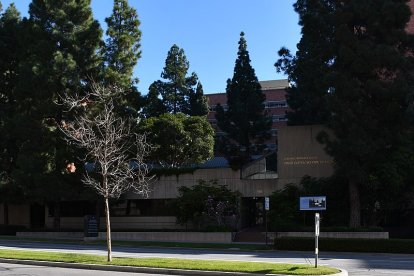Director of UCLA DEI program plagiarized much of her dissertation
The Daily Wire and City Journal published an exhaustive investigation into how Natalie J. Perry stole material from other published work. Many of the victims of plagiarism are demanding the university to take action against her.

Facultad de Medicina de la UCLA (Wikimedia Commons).
A joint investigation by The Daily Wire and City Journal revealed that the career of Natalie J. Perry, the director of the "Cutural North Star" program at the University of California, Los Angeles, (UCLA) School of Medicine, is based on fraud and plagiarism.
UCLA has been committed to the ideology of diversity, equity and inclusion, known as DEI, which is a very important element in the program directed by Perry. In fact, in March of this year, the university honored Perry for teaching students to "do what’s right," highlighting that Perry's “empathy” and her way of listening to others constitute the reason for her "success as an educator and a leader."
However, The Daily Wire and City Journal took a look at Perry's academic record, who despite UCLA's praise, is far from exemplary.
According to research by both outlets, Perry has just one published paper, a Ph.D. dissertation at the University of Virginia about how universities should create broader DEI programs.
According to The Daily Wire and City Journal investigation, large sections of Perry's work were plagiarized, as she took passages from 10 studies, copying several paragraphs without proper attribution. In fact, she also did not mention at least four of the 10 plagiarized papers anywhere in her dissertation.
How did Perry plagiarize?
The Daily Wire and City Journal provided some examples of Perry's plagiarism. According to them, in her first three pages, it is evident that she did not read beyond the first page of the papers she copied. In fact, in the second sentence of her dissertation, she copied--verbatim--part of a sentence on the first page of a study by Adrianna Kezar, Peter Eckel, Melissa Contreras-McGavin and Stephen John Quaye. Furthermore, in the third paragraph, she copied more than 100 words from the first page of a paper by Angela Locks, Sylvia Hurtado, Nicholas Bowman and Leticia Oseguera, without properly citing these sources.
The report highlighted that Perry included some quotes in parentheses but without indicating the papers she had taken them from, but simply rewrote quotes included in the stolen extracts. To exemplify this point, the journalists noted that in a paragraph ending with "(Bernard, 2005; Bollag, 2005; Muñoz, Jasis, Young, & McLaren, 2004; Williams, Nakashima, Kich, & Reginald, 1996)," Perry actually did not summarize what was written by those authors, but rather copied a quote from a study by Adalberto Aguirre and Rubén Martínez, without giving the corresponding credit.
The investigation revealed that a central part of Perry's dissertation consisted of copying work from professors Robert Quinn and John Rohrbaugh. However, instead of citing them directly, Perry relied on summaries by other scholars, and copied and pasted almost 1,000 words from a paper by Chad Hartnell, Amy Yi Ou, and Angelo Kinicki, again without citing and crediting the authors.
The rest of Perry's analysis of Quinn and Rohrbaugh's work, the report noted, was largely copied from a 2003 study by John Smart, without citing or crediting the author.
In a section titled "Positioning Diversity Leadership in Higher Education," Perry also copied almost every sentence from various studies without giving credit, while in a section on organizational culture, she also stole material from a variety of authors.
According to the researchers, Perry's plagiarism could have been used to disguise academic deficiencies, because they found spelling errors and confusingly worded explanations when plagiarism was not possible, e.g. when she cited some of her colleagues at the University of Virginia that she had interviewed for the paper.
Furthermore, Perry did not mention some of the studies she cited parenthetically in the body of the paper in the references section, indicating that she simply copied them from elsewhere.
Researchers from The Daily Wire and City Journal concluded that a legitimate academic environment would never have considered this dissertation as serious work.
Plagiarism victims respond (and don't respond)
Perry's plagiarism did not go unanswered. After the publication of the investigation by The Daily Wire and City Journal, many academics stated that this type of fraud is "unheard of."
The Daily Wire noted that Angelo Kinicki, a professor at Arizona State University's W. P. Carey School of Business and victim of Perry's plagiarism, called it "unheard of" and "unbelievable." He continued: "If she’s supposed to be the carrier of the culture and she steals people’s work, what does that tell you? What kind of culture are we creating here?" he added.
Kinicki also protested the lack of response from UCLA. "If I was sitting on a tribunal I’d say revoke her Ph.D.," he said. “It degrades other degrees. If UCLA doesn’t, that’s an abdication of their responsibility," he added.
Kinicki also pointed out other academics who suffered from Perry's plagiarism for not raising their voices on the matter due to their ideological proximity to her. "If those people who are victims won’t speak up or say something, they’re contributing to it, they’re condoning it," Kinicki said.
Speaking to The Daily Wire, Neal Schmitt, a professor of organizational psychology at Michigan State University, compared his work to hers and said, "It seems to be plagiarism to me." He added: "If it is plagiarism, I do not believe the person should continue to hold an administrative role at UCLA."
Has UCLA lost its focus?
Some events that have occurred and are occurring at the UCLA School of Medicine demonstrate that the institution has been losing its focus. In fact, as The Daily Wire noted, its students were subjected to lessons on two-spirits, among other things. The students also had to take a class on structural racism, in which a guest speaker praised Hamas and urged them to shout, "Free Palestine."
Additionally, the college planned to segregate students by race in courses on leftist ideology, and two of its psychiatry residents advocated for "revolutionary suicide."
The university has also recently come under fire for forcing students to attend health equity classes to promote "fat positivity." The reading material provided during the lessons states, among other things, that the term "obesity" is an insult "used to exact violence on fat people."
RECOMMENDATION





















